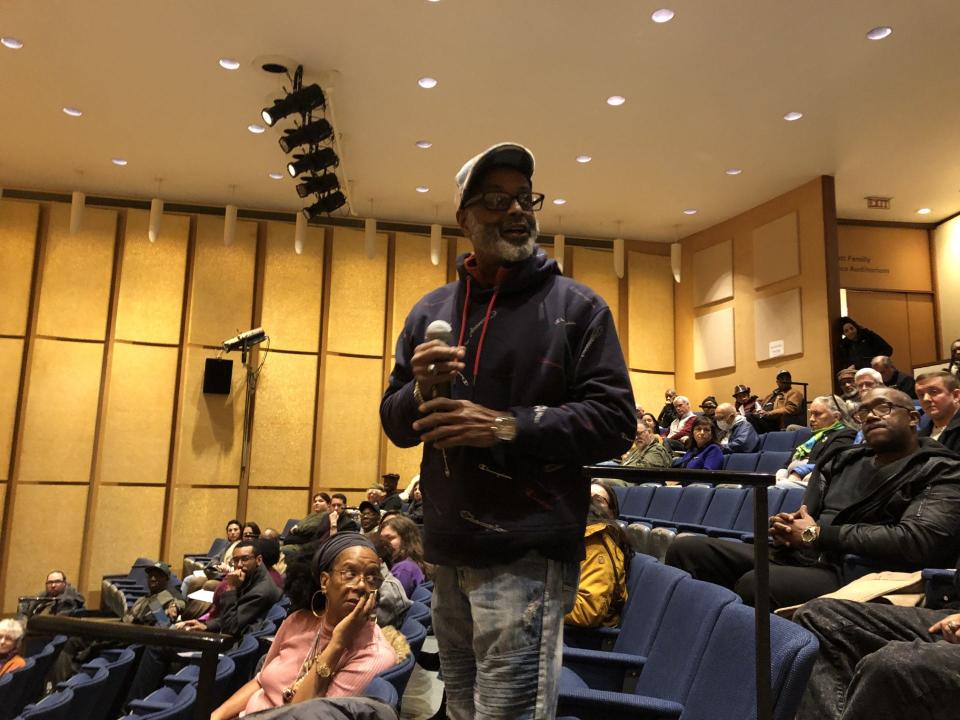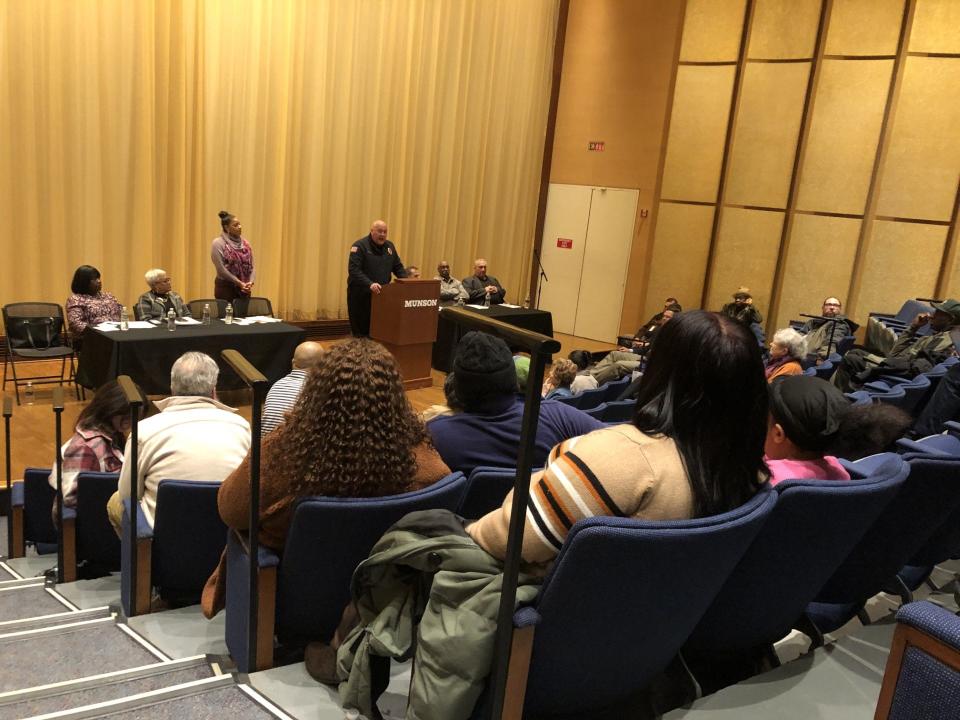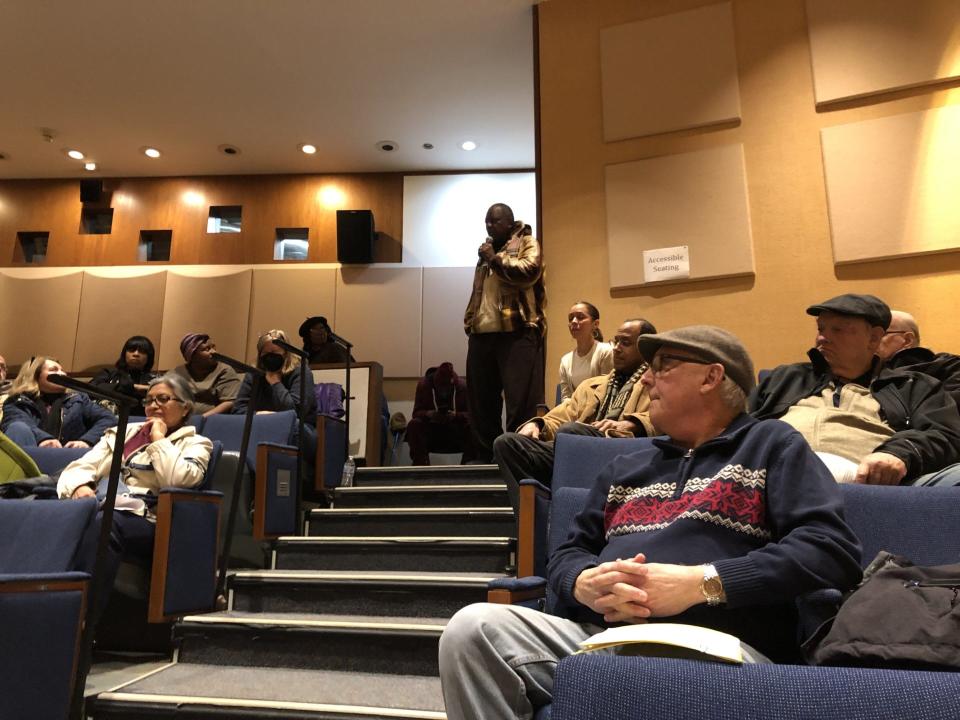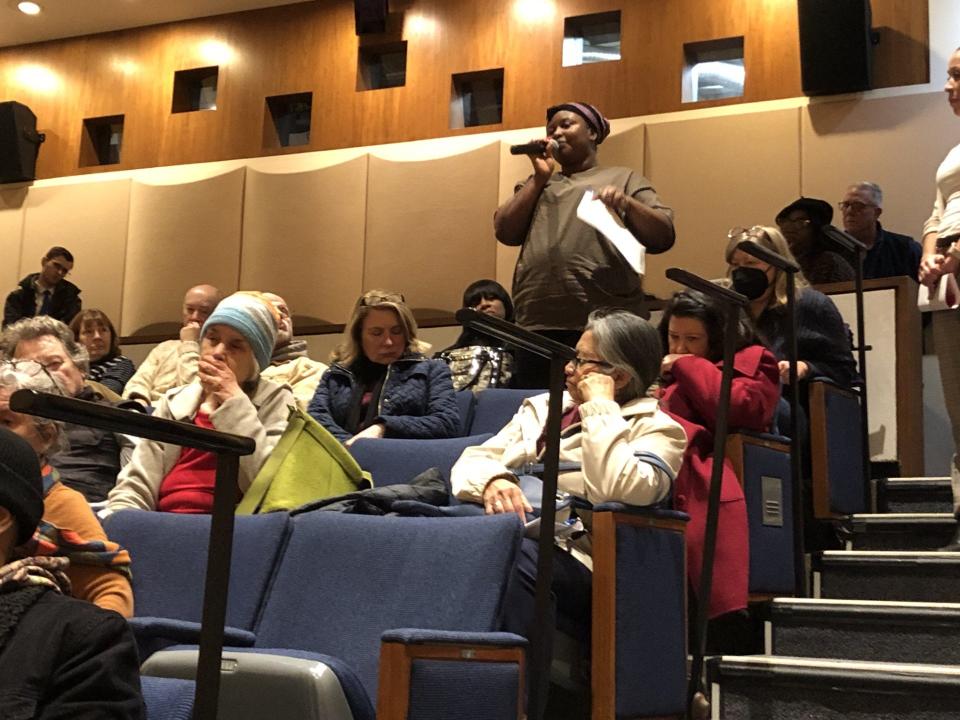Guns big topic at Utica public safety town hall: What you should know
- Oops!Something went wrong.Please try again later.
When the Utica community turned out to express their concerns about public safety Monday evening, their thoughts turned, seemingly almost unanimously, to the same issue.
“My concern is the gun violence …. because it pains me how many shootings are going on in Utica,” said Eugene Bradley, the first audience member to speak during the question-and-answer portion of the town hall held in the Munson auditorium by the Utica Civilian Public Safety Advisory Board.
Bradley, like many audience members who spoke, called for places for teens to go with programs, structure and education, a call that was greeted with applause by the audience.
“We are losing,” he said, “our young kids.”

The formation of the advisory board and the town hall meeting are part of the city’s response to police reforms mandated by an executive order signed by former Gov. Andrew Cuomo in 2020. The purpose of this town hall, board members said, was to get input from the community and answer its questions.
At a time when relations between law enforcement and communities, particularly communities of color, are tense or openly hostile in many parts of the country, discourse at the town hall, which included police officers and elected officials, remained calm and respectful. The closest thing to heckling was directed at a school board member, not the police chief or mayor.
Gun issues
In January, Utica has already had two gun-related homicides and two non-fatal shootings. Police Chief Mark Williams acknowledged that minors are now more frequently the perpetrators and victims of gun violence in Utica.
And, city officials assured the audience that everyone is on the same side. Galime: “We who are sitting here in this row,” promised Mayor Mike Galime, referring to the seats of police and city officials, “we do not want to see another child shoot another child.”
Pastor James Lilley, of the Tabernacle of Deliverance in Christ, expressed confidence that the whole community, working together, can make an impact. “We’re gonna stop gun violence in Utica,” he said, “and we’re going to be a model for the rest of the people.”

About the advisory board
Why does Utica have a citizen advisory board and what does it do?
When Cuomo mandated local police reform in 2020, Utica got to work, Marques Phillips, the city’s codes commissioner who was former Mayor Robert Palmieri’s chief of staff at the time, explained at the beginning of the town hall.
One of the reforms was the creation of the advisory board with seven seats, two to be filled by the mayor, two selected by the Common Council, two to be chosen from nominations made by local nonprofits and one to be chosen by the NAACP.
Those seats are now filled by:
Monalisa Fermin, a Cornhill resident active in community-police affairs, appointed by the Common Council.
John Ciccarelli, appointed by the Common Council.
Jim Winston, a retired police officer appointed by Palmieri.
Tifanie Davis, a Cornhill resident appointed by Palmieri.
Sonia Martinez, executive director of the Mohawk Valley Latino Association, appointed by the NAACP.
Darlene Mack Brown, an employee of Mohawk Valley Community Action Agency, which nominated her for the board.
Dzevad Racic, an employee of The Center nominated by his employer.
The first town hall on Monday was to let the community express concerns and ask questions. Residents can file complaints or compliments about the police with the advisory board.

The board will work with a paid auditor who will investigate areas of community concern, Phillips said.
The board will hold another town hall based on its findings and recommendations for change, he said.
Stopping gun violence
What ideas did community members express for stopping youth gun violence?

“Parents, check out your teenagers,” Lilly suggested, repeating a frequent theme of the evening. Other speakers pointed out, though, that many parents never got the support they needed when they were young and aren’t equipped to guide their children.
Several speakers, like Bradley, called for more safe, structured activities for kids. Hawa Peters, director of the Utica Royalties, pointed out that her program already offers classes for kids and that many of those students also participate in programs such as Junior Frontiers, Young Scholars and the Young Entrepreneurs Academy. “So there are programs out there,” she said. “People have to know how to access them.” The programs could also, she pointed out, use more support and funding to grow.
A student told the crowd that it was nice that the town hall was being held. “That still doesn’t stop me fearing every day that my friends are going to die,” he said. How, he asked, can the police get guns out of teens’ hands?
“The Lord helps those who help themselves,” said one woman who didn’t give her name. “The bottom line is — we need to start snitching.” Police Chief Williams had already pointed out that the police often do not receive a lot of information from the community when investigating shootings.
Kamal Fardan, who described himself as formerly incarcerated, called for a group of formerly incarcerated people who have turned their lives around to work with youth. He argued that they are better able to understand and relate to youth involved in gangs. “We need more people,” he said, “from the street getting involved.”
One woman pointed out that poverty is at the root of the problems with which the city is dealing. “And if we can’t solve the poverty problem,” she said, “we can’t solve the other problems.”
County Legislator Evon Ervin, who lives in Johnson Park, said she knows people who have been willing to give information to the police, but were afraid the police would come knock on their door, letting the community know that they had provided information. There has to be a bridge for people to provide information without drawing attention to themselves, she said. “I know we have to make sure that people feel safe,” Ervin said.
The Oneida Square Arts District Association formed this year to see if the arts could help that part of the city reach its potential, Robert Sullivan said. The arts might be able to help youth, too, he said. “We kind of overlook the arts, Sullivan said, “as a way to reach out and grab kids and to save kids.”
When he was younger, Anthony Testa, 20, and his friends used to play football in a parking lot, he said. One day a police officer stopped and played with them for half an hour, he recalled. “That made our day,” he said. And that was because the kids trusted the officer, Testa said. The city has to work on developing trust between the police and the population, he said.
What are the police already doing about gun violence?
More: More communities join Mohawk Valley's Hometown Heroes banner program
More: Oneida Indian Nation sees increase in spending: A look at the numbers
In response to questions from the audience, Chief Mark Williams outlined some of the tools his department is using to tackle gun violence and Phillips outlined how the Palmieri administration spent related grant money:
The city has about 35 cameras mounted on poles in high-crime areas and has purchased 40 more. Getting them on the poles has proven slow because of the red tape involved in getting clearance from Verizon and National Grid.
Police officers spend hours looking at video from those cameras, home and business cameras and police cameras, trying to solve crimes. They also get help from stationary license plate readers.
The city hired five more police officers specifically to work on gun violence cases.
A Junior Public Safety Academy hires about 20 youth part time who learn about careers in law enforcement and the fire department.
The police now have better body cameras that can see more.
Some grant money was used to enhance the crime lab.
The SNUG (guns spelled backwards) program, based in Utica at ICAN, is one of 14 across the state working to prevent gun violence by mediating conflicts, deploying street outreach workers and engaging with high-risk youth. A SNUG employee in the audience talked about helping at-risk youth with job applications, life skills training and old-fashioned fun, like rollerskating.
Williams assured the audience that his department understands the stakes when it comes to solving shootings. It’s not just about justice.
“If we don’t make an arrest,” he said, “there’s going to be a retaliatory shooting.”
This article originally appeared on Observer-Dispatch: Utica public safety advisory board holds town hall focusing on guns

